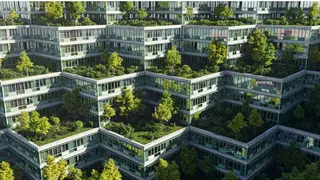Monday was United Nation’s first International Day of Clean Air for Blue Skies. There is no denying that for the last few months we have had clear skies and clean air in most of our cities — the same cities that previously reeled under severe air pollution and smog. But we have achieved this for all the wrong reasons — thanks to the Covid-19 pandemic and a halt in economic activities. But was breathing easy a short-lived reality?
With the opening up of commercial establishments and easing of the lockdown, air quality is once again showing signs of deterioration. The increase in city traffic, the onset of winter, and little sign of the coronavirus pandemic abating do not augur well for the health of the population. To achieve “blue skies” and “a right to breathe clean air” in the long term and for the ‘right’ reasons, there is still a long way to go despite the fact that some policies towards this have been put in place over the years.
To commemorate International Day of Clean Air for Blue Skies, several cities in India have joined a global pledge promising greater action to improve air quality. In the pledge, the cities acknowledge that breathing clean air is a fundamental human right and there is need to enhance stakeholder engagement for this at all levels. They commit “to promote and facilitate actions to improve air quality.” The cities that signed up include Bhuj, Dalhousie, Gangtok, Jamnagar, Kanpur, Kochi, Kurseong. Lucknow, Mandi, Nagpur, Panaji, Patna, Port Blair, Rajkot, Shimla, Siliguri, Surat, Thane, Thiruvananthapuram and Udaipur. While many of them are in midst of active clean air programmes, others would be looking to formulate initiatives to be rolled out in the future.
The pledges primarily need to be seen in the context of the commitment India made in January 2019 when it launched its National Clean Air Programme (NCAP) to prevent, control and reduce air pollution and improve air quality monitoring across the country. The aim was to reduce fine particulate (PM2.5) and particulate (PM10) air pollution by 20 per cent to 30 per cent by 2024 and formulate city-specific action plans for it.
Later, in July 2019, the country formally joined the Climate & Clean Air Coalition (CCAC), a worldwide partnership among countries, businesses, scientific institutions, civil society, and intergovernmental organisations for “catalysing concrete, substantial action to reduce Short-Lived Climate Pollutants, including methane, black carbon and many hydrofluorocarbons.” This would lead to better air quality, improving the health of the population and preventing more than 2.5 million premature deaths from air pollution every year.
So, what have the cities been up to in combating air pollution? With the situation getting worse every year, cities like Delhi, Mumbai and Pune put it place the Air Quality Index (AQIs) monitoring systems a few years ago. In 2018, Ahmedabad was the first to formulate an Information and Response Plan (AIR) to support the AQI. This increased focus on action by communicating health risks, preparing response co-ordination for vulnerable people and preparing for contingencies.
ICLEI South Asia, which works with several Indian cities to improve their ecology parameters, has also established ambient air quality monitoring stations in Rajkot, Coimbatore, Udaipur and Siliguri through its Capacity Building for Low Carbon and Climate Resilient City Development in India (CapaCITIES) project. Through the same project, Udaipur will also receive a clean air action plan.
All these should help the cities monitor their air quality parameters on daily basis and plan actions based on the same. United Nations Environment Programme (UNEP) is also working with the government to find clean air solutions in Agra, the Taj Mahal tourist hot spot.
Towards EV, green freight
Air monitoring, however, is only one step. The major sectors that contribute to air pollution are transport, industry, and construction. Apart from this burning of biomass, refuse and re-suspension of road dust are major polluters. Hence, initiatives to promote electric vehicles for public and private purposes and to encourage green freight could go a long way.
ICLEI, for instance, has been involved in Project Ecologistics primarily to promote low-carbon freight movement in the three cities of Kochi, Panaji and Shimla.
The Natural Resources Defense Council (NRDC) has also been working with States such as Delhi, Telangana and Gujarat to encourage electric vehicle infrastructure through policy intervention. It feels only economic and policy drivers can help to scale up electric vehicle market for 2-wheelers, 3-wheelers, ride-hailing vehicles, and private buses. This, in turn, should have a positive impact on air quality in the long run.
Emani Kumar, Deputy Secretary General, ICLEI, and Executive Director, ICLEI South Asia, sums up the challenge ahead succinctly: “We have been seeing blue skies in our cities, thanks to the lockdown. But such short-term environmental benefits are no substitute for planned and sustained action.”








Comments
Comments have to be in English, and in full sentences. They cannot be abusive or personal. Please abide by our community guidelines for posting your comments.
We have migrated to a new commenting platform. If you are already a registered user of TheHindu Businessline and logged in, you may continue to engage with our articles. If you do not have an account please register and login to post comments. Users can access their older comments by logging into their accounts on Vuukle.